The AMD Zen and Ryzen 7 Review: A Deep Dive on 1800X, 1700X and 1700
by Ian Cutress on March 2, 2017 9:00 AM ESTBenchmarking Performance: CPU Web Tests
One of the issues when running web-based tests is the nature of modern browsers to automatically install updates. This means any sustained period of benchmarking will invariably fall foul of the 'it's updated beyond the state of comparison' rule, especially when browsers will update if you give them half a second to think about it. Despite this, we were able to find a series of commands to create an un-updatable version of Chrome 56 for our 2017 test suite. While this means we might not be on the bleeding edge of the latest browser, it makes the scores between CPUs comparable.
SunSpider 1.0.2 [link]
The oldest web-based benchmark in this portion of our test is SunSpider. This is a very basic javascript algorithm tool, and ends up being more a measure of IPC and latency than anything else, with most high performance CPUs scoring around about the same. The basic test is looped 10 times and the average taken. We run the basic test 4 times.
Mozilla Kraken 1.1 [link]
Kraken is another Javascript based benchmark, using the same test harness as SunSpider, but focusing on more stringent real-world use cases and libraries, such as audio processing and image filters. Again, the basic test is looped ten times, and we run the basic test four times.
Google Octane 2.0 [link]
Along with Mozilla, as Google is a major browser developer, having peak JS performance is typically a critical asset when comparing against the other OS developers. In the same way that SunSpider is a very early JS benchmark, and Kraken is a bit newer, Octane aims to be more relevant to real workloads, especially in power constrained devices such as smartphones and tablets.
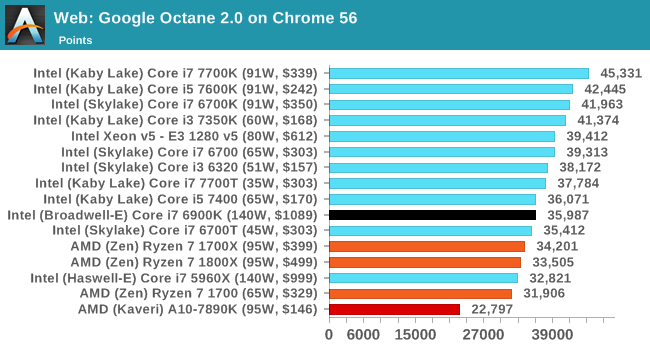
WebXPRT 2013 and 2015 [link]
While the previous three benchmarks do calculations in the background and represent a score, WebXPRT is designed to be a better interpretation of visual workloads that a professional user might have, such as browser based applications, graphing, image editing, sort/analysis, scientific analysis and financial tools. Web2013 is the older tool, superceded by Web2015, however both still are highly relevant for high-performance web applications today.
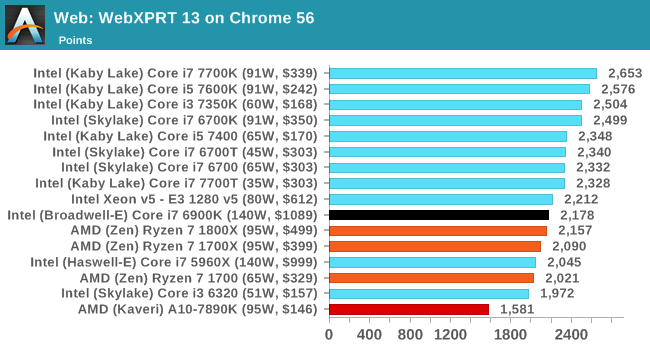
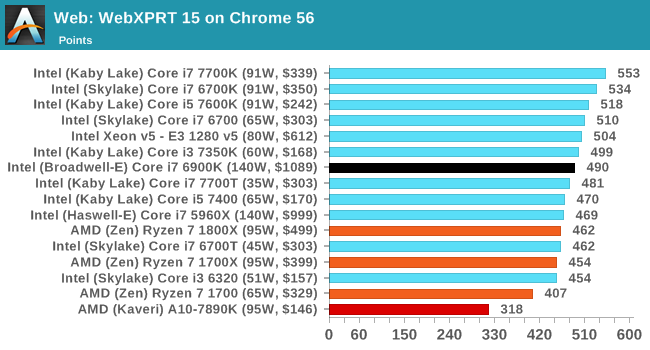


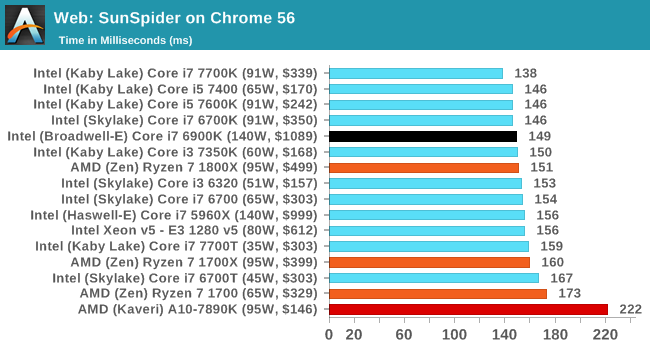
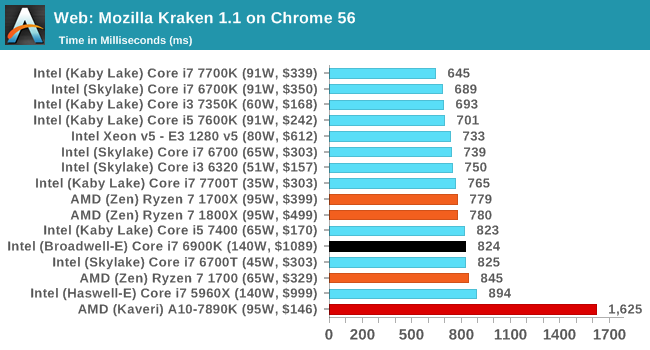








574 Comments
View All Comments
BurntMyBacon - Friday, March 3, 2017 - link
@Gothmoth: "gamer... as if the world is only full with idiotic people who waste their lives playing shooter or RPG´s."PC Gaming happens to be one of the few growing areas in the PC market. Not everyone games, but for those that do, the 7700K is still worth considering. Dropping $500 on the 1800X may not be the best call for those that don't take advantage of the parallelism. Of course, the 1800X wasn't really meant for people who can't take advantage of the parallelism. AMD will have lower cost narrower processors to address that gap. I'm curious as to how the performance/price equation will stand once AMD releases their upper end 6c/12t and 4c/8t processors.
Beany2013 - Friday, March 3, 2017 - link
Sod the 1800X - I need a new VM server, and if I want all the threads (sixteen), I can either drop £450 on a Xeon E5 2620 at 2.1-3ghz (cheapest Intel 16 thread option I can find), or I can spend £100 less, and get a Ryzen 7 1700 (3.0-3.7ghz) and put that extra money towards more RAM so I can run more VMs and get more work done.For those of us who aren't high end gamers - which is basically almost everyone, and a far more significant market - these chips may well give Intel a bloody nose in the workstation space; AMD have confirmed they'll use ECC RAM quite happily.
Photographers, videographers, CAD-CAM, developers etc are a bigger market in terms of raw units than high end gamers, and these chips look like being a pretty compelling option as it stands.
Steven R
Beany2013 - Friday, March 3, 2017 - link
(VM server for home, I should have noted - for work, I'll see how the Ryzen based opterons and supermicro mobos etc pan out - money is important in these factors, but I'm not a moron, and I'm not going to run production gear on gaming hardware, natch....)BurntMyBacon - Friday, March 3, 2017 - link
@Beany2013: "I need a new VM server, and if I want all the threads (sixteen), I can either drop £450 on a Xeon E5 2620 at 2.1-3ghz (cheapest Intel 16 thread option I can find), or I can spend £100 less, and get a Ryzen 7 1700 (3.0-3.7ghz) and put that extra money towards more RAM so I can run more VMs and get more work done."It is clear by this statement that you fall into the category of people that can take advantage of the parallelism. Therefore, my statement doesn't apply to your presented in the slightest.
I don't disagree that the Ryzen 7 series has a lot to offer to a lot of people (myself included). If I were in the market today, I'd be looking long and hard at an R7 1700X. The minor drop in gaming performance is less significant to me than the increase in performance for many other tasks I use my computer for. I do a little bit of dabbling in a lot of different things (most of which benefit from high thread count). I have noticed that for the set of applications I have open simultaneously and the tasks I have running, my computer is more responsive with more cores or threads, but single threaded performance is still important to the individual tasks.
In my workflow: (i3 < i5/FX-8xxx < i7 <? R7)
My point was that there is in fact a not so insignificant market of people putting computers together for the primary purpose of gaming. This market appears, by all metrics, to be growing. For this market, Intel's i7-7700K or better yet i5-7600K are still viable options that provide better performance/price than AMD's current options. I'll repeat: "AMD will have lower cost narrower processors to address that gap. I'm curious as to how the performance/price equation will stand once AMD releases their upper end 6c/12t and 4c/8t processors."
Cooe - Sunday, February 28, 2021 - link
"or better yet i5-7600K"Arguably the most short-sited statement in this entire comments section lol. The 4c/4t i5's had roughly equal gaming performance to Ryzen at launch but with ZERO headroom left for the future. This is why the i5-7600K gets absolutely freaking ROFLSTOMPED by the R5 1600 in modern titles/game engines.
JMB1897 - Friday, March 3, 2017 - link
Compelling, but I don't think it's totally there yet. I'd be worried about the memory issues. Increased latency as you add more DIMMs and dual vs quad channel. I'd spend that extra 100 on a Xeon personally.Sttm - Friday, March 3, 2017 - link
Thats who buys off the shelf CPUs thats cost $$$, Gamers. Thats who AMD needs to please with their product. GAMERS. Thats why AMD's stock has been tanking since Ryzen reviews went up, because GAMERS are the demographic that matters when it comes to performance CPU sales.deltaFx2 - Saturday, March 4, 2017 - link
@Sttm: You have an inflated opinion of the impact of gamers. No, AMD's stock isn't tanking because of gamers. I suggest you also look at Nvidia's stock, which is well down from its high of ~120, to ~98. Wed-Friday, Nvidia dropped from 105 to 98, and it dipped below that to ~96 at one point. That's roughly 7-8%. The two stocks are often correlated on drops, with AMD amplifying nvidia's drop. Both do GPUs, see? Some people make tonnes of money shorting AMD (and in recent times have lost their shirt doing so).Here's the truth: All Desktop, as per Lisa Su, is a 5 bn TAM market and gaming is part of this (let's say 50%). Nothing to scoff at, sure, but compared to laptop and server, it's a rounding error. There's NOTHING in these tests/reviews to suggest that AMD will suck in those markets; in fact, quite the opposite: power looks good, perf looks good. AMD's stock (long term) won't tank on the whims of gamers. They help get the mindshare, which is the only reason they're worth catering to (they tend to be a vocal, passionate, and sometimes irrational lot. You won't see datacenter gurus doing the stuff that gamers do. They certainly won't shoot each other over whose GPU is the best).
cmdrdredd - Saturday, March 4, 2017 - link
Believe it or not there are millions of people worldwide who pretty much use their PC for two things. The internet (web browsing, email etc) and gaming. You don't need 16 threads to check email and read forums either so gaming performance is going to be critical. It's not just the CPU performance, it's the entire platform that contributes to Gaming related performance.sans - Thursday, March 2, 2017 - link
Yeah, stick with Intel because Intel is the standard and its products are the best for each respective market. AMD is a total failure.